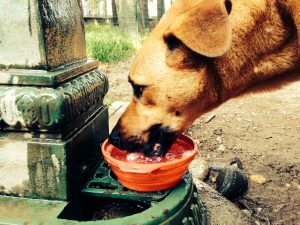Fun In The Sun: Summer Pet Safety Review
 Bonding in the great outdoors is one of the best parts of pet ownership. Whether you’re heading out for a hike on the St. Joseph’s Hill trail or just playing in the yard, you and your pet can enjoy the beautiful summer weather safely by being prepared.
Bonding in the great outdoors is one of the best parts of pet ownership. Whether you’re heading out for a hike on the St. Joseph’s Hill trail or just playing in the yard, you and your pet can enjoy the beautiful summer weather safely by being prepared.
Keep our summer pet safety tips in mind before you and your pet head out for your next adventure.
Paw Care
Your dog’s paw pads are more sensitive than they appear, and hot pavement or concrete can often be too hot for them to safely walk on. A good rule of thumb is: if it’s too hot for your bare feet, it’s too hot for your dog’s. Find grassy and/or shaded areas to walk your pooch, or limit walks to early morning and evening hours when life’s just a little cooler.
The Heat Is On
High temps and sunny days can spell big problems for outdoor loving pets. Pay close attention to your pet when outside, and watch for the following signs of overheating, including:
- Heavy panting
- Bright red, blue, or pale gums that are tacky to the touch
- Confusion, disorientation
- Vomiting
The above conditions should be considered a medical emergency. Call us if you notice any of these symptoms in your pet, and take action to cool your pet down:
- Move your pet into the air conditioning or shade as quickly as possible
- Help your pet gradually reduce his or her internal temperature by wrapping the body in lukewarm, wet towels (never use cold water, as it can cause shock)
- Offer water to drink
“Short-nosed” pets, such as bulldogs, pugs, Pekingese, and Siamese cats are at increased risk for heat related injuries, thanks to their flat faces and shortened tracheas. Keep short-nosed pets indoors as much as possible during the summer months, and only exercise them in the morning and evening when temperatures are cooler. If you notice your short-nosed pet struggling to breath at any point during exercise, stop immediately, move to a shaded area, and give us a call.
Grassy Problems
The tall grasses that abound in our area present their own particular summer problems for pets. Foxtails are a particular concern, as the barbed seed heads can work their way into your pet’s body via the nose, ears, mouth, or skin, and can cause painful matting of the fur if not removed. Keep your pet away from tall grasses, and check him or her for foxtails daily, removing any that you see. If you discover an embedded foxtail in your pet, give us a call.
Tall grasses can also harbor ticks, which are capable of spreading various diseases to our pets, including Rocky Mountain Spotted Fever, Lyme disease, and Ehrlichia. Besides avoiding tall grass, make sure your pet is up to date on his or her flea and tick preventive medication.
Other Summer Pet Safety Tips
- Never leave your pet in a parked car. Temperatures can climb to dangerous levels in moments, even if the window is cracked or the car is parked in the shade. Leaving pets in parked cars is the number one cause of heat related pet deaths.
- Always provide pets with plenty of fresh, cool water. Place outdoor water bowls in shady areas to prevent the water from heating up.
- Pets can get sunburned too! Consider applying a pet safe sunscreen to your pet’s nose, ears, and belly if you are going to be out and about. Give us a call for recommendations.
Your friends at The Whole Pet Vet Hospital And Wellness Center want you and your pet to enjoy a safe and fun summer. Don’t hesitate to contact us with any questions or concerns, or to set up an appointment for a summer wellness exam for your pet.
